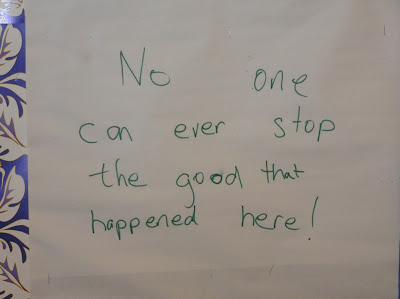The irregular and disjointed rantings and ramblings of a lifelong inside-the-loop Houstonian, dedicated urbanist, enthusiastic traveler and loyal University of Houston Cougar fan, who also roots for the University of North Texas Mean Green.
Monday, August 31, 2009
2009 Preview: North Texas Mean Green
Going into the 2009 season, the good news for North Texas fans is, well, things can't get much worse from last year's 1-11 campaign. Last season was without a doubt one of the worst and most disappointing in Mean Green history. The team suffered several blowout losses - only one loss was by less than ten points - and its one win was against a team that was not considered a full member of the NCAA's Football Bowl Subdivision last season.
There was hope, going into 2008, that the Mean Green could build upon what had been a prolific and entertaining spread offense in 2007, as well as an improvement in the defense engineered by the return of coordinator Gary DeLoach, to improve on 2007's 2-10 campaign. Instead, the team took a step backwards on both sides of the ball. The offense, which scored 24.8 points per game in 2007, managed 20.0 points per game in 2008 - 102nd in the 119-team Football Bowl Subdivision in scoring - and turned the ball over 33 times. The defense, as bad as it was in 2007, was even worse in 2008, surrendering an a cringe-inducing 47.6 points per game and ranking dead last in the FBS in both total defense and scoring defense. Special teams were a sore spot as well, as the team finished 111th in punt returns and 114th in kickoff returns.
I saw North Texas in person once last season, when they came to Houston to play Rice. I went to Rice Stadium expecting to see a high-scoring shootout between two prolific offenses, and early in the second quarter, with Rice leading 28-20, it appeared that my expectations would be met. But then the Mean Green fell apart and the Owls ran off 49 unanswered points in route to an ugly 77-20 blowout. Quarterback Giovanni Vizza threw three interceptions, two of which were returned for touchdowns, UNT special teams missed an extra point and a field goal and muffed a kickoff reception, and the North Texas defense simply had no answer for the Owls' passing and receiving combo of Chase Clement and Jarrett Dillard. It was clear at that point that the Mean Green were in for a frustrating season.
Indeed, the best thing that can be said for the 2008 season is that it is over. All that the Eagles, led by third-year head coach Todd Dodge, can do now is shake off their disappointment from last year and resolve not to let such a disaster happen again in 2009.
There will be some changes his fall, most notably behind center. Coming off a disappointing year and realizing that he was in competition for the starting job with the coach's son, Giovanni Vizza saw the writing on the wall and transferred out of North Texas. The task of quarterbacking this team now falls upon Riley Dodge, who is familiar with his father's offense from his time at Southlake Carroll High School. The problem with Dodge is that he's very inexperienced at this level. He spent some time playing at receiver and quarterback last season before being suffering an injury, which garnered him a medical redshirt. If the Mean Green are to have any success at all this fall, Riley Dodge is going to have to adjust to the college game, and do so quickly.
It doesn't help matters that the offense also lost one of its biggest weapons last season, receiver Casey Fitzgerald, to graduation. In fact, there was a great deal of turnover throughout the receiving corps, and a lot of newcomers will be counted upon to catch Dodge's passes this fall. However, the team retains a potent weapon in senior running back Cam Montgomery, who rushed for 928 yards and nine touchdowns last year. His backup, Lance Dunbar, also proved to be capable last season before he was sidelined with an injury. For all of the importance that the spread offense puts on the pass, the lack of experience behind center as well as the receiving corps as well as the strength of the running game suggests that the Mean Green are probably going to rely heavily on the ground game for at least the first portion of the season. This might be a good thing, as it has the potential to eat up clock and keep the porous UNT defense off the field. The offense can take solace in the fact that the offensive line was one of the few areas of improvement last season and returns experienced and intact. They'll be needed to create holes for the running game as well as protect the young quarterback behind them.
The fact that the team is returning nine starters on defense would normally be a good thing. However, given how bad the defense was last season, that may not be the case. Fortunately, the Mean Green defense is not entirely bereft of talent: lineman Eddrick Gilmore and linebackers Tobe Nwigwe (111 tackles and three interceptions last season) and Craig Robertson all had respectable seasons last year. The linebacking corps appears to be solid, and the secondary, which lacked any help in the form of a pass rush, at least showed improvement over the course of the season. The biggest problem is a relatively inexperienced defensive line that could not stop the run and could only manage 11 sacks all last season. They have to get better if North Texas is going to have any chance this fall.
New special teams coach Shelton Gandy has his work cut out for him. Last year, this portion of the Mean Green's game was abysmal: it made only 12 of 17 field goal attempts, gave up an average of 13.1 yards and two touchdowns on punt returns, gave up an average of 31 (!) yards and three touchdowns on kickoff returns, and did not manage a robust return game themselves. At this point, any improvement on special teams would be welcome.
Perhaps unsurprisingly, the national sports media does not expect a lot from North Texas this fall. CollegeFootballNews.com foresees a three-win season for the Eagles, while CollegeFootballPoll.com, whose Congrove Computer algorithm has accurately predicted UNT's season record eight out of the last fourteen years, expects another 2-10 campaign. The New York Times is also on record as expecting a 2-10 campaign. Sports Illustrated ranks UNT 119th out of 120 FBS teams (ahead of FBS newcomer Western Kentucky, who was the only team UNT beat last season) and foresees a 2-10 season for the Mean Green as well, good enough for eighth place in the nine-team Sun Belt Conference. CBS Sports concurs with that projected placement. Jeff Sagarin's preseason rankings put North Texas 165th in all of Division I and dead last in the Football Bowl Subdivision; his numbers would imply that a winless season is in store for UNT.
So what do Todd Dodge, his staff and his players need to do in order to best these bleak predictions and improve on last year's dismal campaign? Well, just about everything. On offense, the team needs to improve its scoring efficiency: with the defense as bad as it is, an average of 20 points per game just isn't going to cut it. Cam Montgomery and Lance Dunbar, as solid as they are, cannot do this by themselves. Riley Dodge and the receiving corps, as inexperienced as they all might be, need to take pressure off the running game by getting the ball down the field and into the endzone. The defense is still going to give up a lot of points, but if they can be more successful stopping the run and mounting a halfway-effective pass rush, both things they did not do with any consistency last season, they can at least keep games close and give their offense a chance to put enough points of their own on the scoreboard to win. Another thing the team as a whole needs to do is improve on a turnover margin that was 116th in the nation last year. That means limiting turnovers on the offensive side of the ball and forcing more turnovers on defense. Better special teams are a must, as well.
These are all things easier said than done, however, and if the team does not improve this fall then the fate of head coach Todd Dodge, a high school coaching legend at Southlake Carroll who came to Denton amidst high hopes and great fanfare, will likely become an issue. UNT Athletics Director Rick Villarreal would have a tough decision to make in that situation, especially due to the fact the Dodge will still have two years remaining on his contract after this season.
For everybody's sake, let's hope that it doesn't come to that. Aside from a trip to Alabama, the Mean Green do not face a particularly onerous schedule in 2009: there are no back-to-back road games and key Sun Belt foes Middle Tennessee and Florida Atlantic come to Denton. If Riley Dodge can grow into his role and lead the offense to greater productivity, and if the defense can at the very least not be as bad as they were last year (and let's face it: there's no place to go but up), then there will be definite hope for the future of the Dodgeball era. It's too much to expect the Mean Green to put together a winning season in 2009, but if the team can manage at least three wins and climb out of the cellar of various offensive, defensive and special teams statistical categories, then the season will be fairly considered a success.
Harry's take on the upcoming season at gomeangreen.com is worth a read as well.
Friday, August 28, 2009
Another school year and another new school for Kirby

 Since Kirby has been bouncing around from school to school over the past year or so, we are hopeful that we've finally found a place that will meet his needs such that he can stay for a long time. So far, he seems to like it. Yesterday he even started riding the bus! Here's him arriving home this afternoon:
Since Kirby has been bouncing around from school to school over the past year or so, we are hopeful that we've finally found a place that will meet his needs such that he can stay for a long time. So far, he seems to like it. Yesterday he even started riding the bus! Here's him arriving home this afternoon: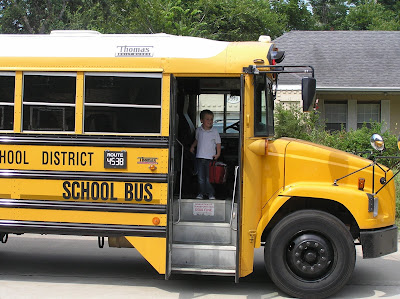
Thursday, August 27, 2009
Pondering the 2009 college football season
Although Florida is the overwhelming favorite to repeat as BCS national champs, there are plenty of other contenders in the mix as well. The Texas Longhorns come in second in both polls, as several pigskin pundits, including si.com's Stewart Mandel, foresee a Florida-Texas showdown in the BCS National Championship Game. The Longhorns return a potent offense including last year's Heisman runner-up, Quarterback Colt McCoy. UT's national championship hopes will most likely depend on how they handle a three-game October roadtrip to Dallas (Oklahoma), Stillwater (Oklahoma State) and Columbia (Missouri).
Oklahoma, Southern Cal, Alabama, Ohio State and Virginia Tech come in third through seventh, respectively, in both polls, while Mississippi (8th in the AP poll and 10th in the Coaches' poll), Oklahoma State (T-9th and 11th), Penn State (T-9th and 8th) and LSU (11th and 9th) occupy to one position or another the next four spots on both poll. California rounds out the top dozen in both polls. My guess is that any of these teams could, along with Texas, challenge Florida for the BCS championship, although I think USC will continue their annual tradition of losing to an inferior opponent sometime during the course of the season and I think LSU (coming off a disappointing 8-5, unranked season) might be starting the season off in an overrated position. I also continue to believe that the structure of the Big 10 season, wherein all of its teams complete their seasons the week before Thankgiving while schools from other conference continue to play for another couple of weeks (conference championship games included), put Ohio State and Penn State at a relative disadvantage in competing for a shot at the title game.
An amusing quirk of both preseason polls is the notable lack of any Big East (an automatic-qualifiying BCS conference) teams in either the AP or USA Today polls, while the non-automatic-qualifying Mountain West Conference has three. That the voters of these polls believe that the top teams in the MWC, whose champion can only go to a BCS bowl under certain conditions, are better than the top teams in the big East, whose champion automatically gets to go to a BCS bowl, is just yet another shred of evidence to the unfairness of the Bowl Championship Series system. Earlier this year there was a Congressional hearing regarding the injustice of the BCS system, but right now it's clear that Congress is not going to interfere, mainly becuase ofthe political influence of all the states whose schools are currently full BCS participants. That means that, for the foreseeable future, schools whose conferences who do not automatically qualify will have a much tougher road to the BCS championship than those that do, and the schools that have the potential to do so will continue to be patronizingly labelled "BCS Busters." There are four of them - the most ever - in the two preseason polls: TCU (ranked 17 in both polls), Utah (19 in the AP, 18 in USA Today) and BYU (20 and 24) from the Mountain West Conference, and Boise State (14 and 16) from the WAC.
A final note about the polls is the appearance of Notre Dame, which comes in 23rd in both polls. After a 7-6, unranked season last year? While the Irish may indeed have a better season in 2009, the only reason they're even ranked going into the season is because, well, they're Notre Dame. It certainly must be nice to be a program whose name counts for more than its recent accomplishments on the field.
So, who do I think is going to win it all this season? Although I think Texas, Oklahoma, Alabama and even Southern Cal all have a good shot, I'd be a fool to pick against Florida right now. The Gators are simply returning too many weapons from a team that won the BCS title last year.
The main thing is that the wait is almost over. Football season is finally here.
Wednesday, August 26, 2009
Kirby goes to Colorado
On Friday, we celebrated Kirby's 5th birthday with a trip to the Children's Museum of Denver. I was actually surprised by how small it was. Of course, few children's museums can compare to the one we have here in Houston, which was already large before it was recently expanded, and regardless of the Denver museum's size, Kirby had a fun afternoon there. Here, Kirby practices his firefighting skills on the museum's fire engine:
 The museum also had a train room, where Kirby spent time building and playing with various layouts. These two pictures were taken with my cell phone, hence the blurriness:
The museum also had a train room, where Kirby spent time building and playing with various layouts. These two pictures were taken with my cell phone, hence the blurriness: Friday evening, we went to a friend's house and celebrated Kirby's birthday with a small party, cake and ice cream.
Friday evening, we went to a friend's house and celebrated Kirby's birthday with a small party, cake and ice cream.On Saturday, David took Kirby and me on an excursion up into the mountains. Our first stop was the scenic Red Rocks amphitheater, overlooking Denver. Here, Kirby scratches his head as he ponders the scale and the scenery of the facility:
 Afterwards, we drove up to Mount Evans. The highest paved road in North America leads to the 14,264-foot peak, where a small visitors center and observatory are located. From the top of the peak, you can quite literally look down on the world:
Afterwards, we drove up to Mount Evans. The highest paved road in North America leads to the 14,264-foot peak, where a small visitors center and observatory are located. From the top of the peak, you can quite literally look down on the world: Given its proximity to Denver as well as the relatively easy access afforded by the paved road, Mt. Evans is a rather popular tourist attraction. Kirby and I took the rocky trek up the pathway from the visitors center to the peak rather slowly, and even then I sometimes felt like I was going to pass out due to the thin air:
Given its proximity to Denver as well as the relatively easy access afforded by the paved road, Mt. Evans is a rather popular tourist attraction. Kirby and I took the rocky trek up the pathway from the visitors center to the peak rather slowly, and even then I sometimes felt like I was going to pass out due to the thin air: Kirby seemed to do just fine in the high altitude. He has now officially been atop a fourteener!
Kirby seemed to do just fine in the high altitude. He has now officially been atop a fourteener! David goes up into the mountains rather frequently, but the only time he ever seems to encounter mountain goats is when I'm with him. These guys were grazing below the summit of Mt. Evans:
David goes up into the mountains rather frequently, but the only time he ever seems to encounter mountain goats is when I'm with him. These guys were grazing below the summit of Mt. Evans: The peak of Mt. Evans overlooks Summit Lake, which at 12,830 feet is the highest park in the Denver Mountain Park System. Here's my brother David, posing in front of the lake and the alpine tundra backdrop:
The peak of Mt. Evans overlooks Summit Lake, which at 12,830 feet is the highest park in the Denver Mountain Park System. Here's my brother David, posing in front of the lake and the alpine tundra backdrop: Saturday night we went into town and dined at the Cherry Cricket, whose burgers (featured on a recent episode of the Travel Channel's Man vs. Food) really are as good as advertised. Kirby also spent some time playing in the pool at Dave's new apartment complex.
Saturday night we went into town and dined at the Cherry Cricket, whose burgers (featured on a recent episode of the Travel Channel's Man vs. Food) really are as good as advertised. Kirby also spent some time playing in the pool at Dave's new apartment complex.All in all, a great trip in spite of its briefness. Kirby had a great time and tells me that he's already ready to go back to the mountains to see Uncle Dave again!
Wednesday, August 19, 2009
Creepy critter of the day
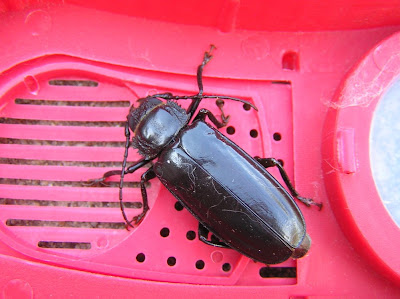 It was a dark, smooth beetle, about 1 1/2 inches long, sporting a rather fearsome pair of pinchers:
It was a dark, smooth beetle, about 1 1/2 inches long, sporting a rather fearsome pair of pinchers: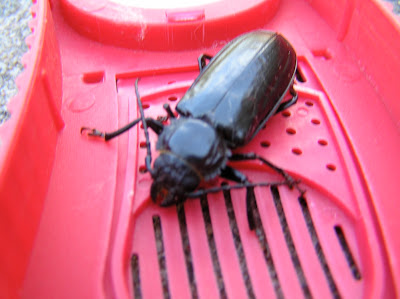 I had never noticed this particular insect around the house before, so I spent some time trying to identify it. It wasn't an easy task, considering the fact that there are somewhere on the order of 350,000 known species of beetles, but I finally determined that this intimidating-looking bug is a hardwood stump borer (Mallodon dasystomus), a member of the longhorn beetle family. It is so named because its larvae reside within the trunks of hardwood trees such as oaks. The adults feed on ants and other tiny insects, which is what the pinchers are for. If they are handled improperly, of course, they can deliver a painful bite to humans as well.
I had never noticed this particular insect around the house before, so I spent some time trying to identify it. It wasn't an easy task, considering the fact that there are somewhere on the order of 350,000 known species of beetles, but I finally determined that this intimidating-looking bug is a hardwood stump borer (Mallodon dasystomus), a member of the longhorn beetle family. It is so named because its larvae reside within the trunks of hardwood trees such as oaks. The adults feed on ants and other tiny insects, which is what the pinchers are for. If they are handled improperly, of course, they can deliver a painful bite to humans as well.Houston, with its location in the southern United States and its abundance of oaks and other hardwood trees, is indeed part of this beetle's habitat. I had just never been aware of them before. Apparently, neither had the staff of the Houston Museum of Natural Science, either, until recently.
After photographing and identifying this critter, I sent him on his way. However, I'm sure this won't be the last exotic insect I find lurking around the house.
Saturday, August 08, 2009
I wish August had a fast forward button
Football season, to me, is like Christmas to a child: the closer it gets, the harder it becomes to wait.
Once more on the drinking age
As lawmakers across the country search for effective solutions to the persistent problem of binge drinking by young people, a prominent member of the presidential commission that recommended raising the drinking age to combat dangerous alcohol consumption has now called it “the single most regrettable decision” of his career. The law was signed by President Ronald Reagan 25 years ago this week.Dr. Morris Chafetz, who founded the National Institute for Alcoholism and Alcohol Abuse, said he reluctantly supported the recommendation but that “legal age 21 has not worked.” He is well known for taking on bold scientific claims and so-called experts, and rarely shies away from challenging the accepted norm. Chafetz says the law has resulted in “collateral, off-road damage” that includes thousands of injuries and fatalities that occur off the roadways.
“Legal Age 21 has not worked,” said Chafetz on the 25th anniversary of its enactment. “To be sure, drunk driving fatalities are lower now than they were in 1982. But they are lower in all age groups. And they have declined just as much in Canada, where the age is 18 or 19, as they have in the United States.”
While I'm sure that the implementation of the minimum legal age has had some effect, the decline in drunk driving fatalities can probably also be attributed to other factors, such as increased public awareness of the problem and more safety features in vehicles. In any case, drunk driving fatalities really should not be the only metric of the success of the minimum drinking age.
Recent research points to the growing number of binge drinkers among college age people, while other populations have seen declines. Unfortunately, the new data do not make clear what policies have contributed to those reductions. While there is no evidence of correlation, let alone solutions, those who oppose any re-examination of the Legal 21 law suggest that what is required is simply more enforcement. Dr. Chafetz adamantly disagreed.
“Enforcement is frustratingly difficult and usually forces the behavior deeper underground, into places where life and health are put at ever greater risk,” said Chafetz. “The 600,000 assaults reported annually, the date rapes, the property damage, the emergency room calls do not in general occur in places visible to the public. They are the inevitable result of what happens when laws do not reflect social or cultural reality.”
We know how well the "more enforcement" solution has worked for us in combating illegal drug use. I'd wager than, in spite of its increased cost, increased enforcement would achieve similarly negligible effects in combating underage drinking. Like Chavetz says, the problem is being driven into places where it's harder to enforce.
I still don't understand why we, as a nation, cannot have a discussion about alternatives to the currrent law. For example, what about a "graduated" approach to drinking? Many states already take such an approach to driving, through graduated drivers licenses. Here in Texas, for the first six months after passing their drivers' tests teenage drivers are restricted from driving with more than one other teenager in the car, using a cell phone, or being on the road between midnight and 5 a.m. There is also a teenage driver education program, Teens in the Driver Seat, that I happen to be very familiar with because Lori is the Houston Area Coordinator for the program at the Texas Transportation Institute. The results of this approach have clearly been quite successful, because Texas leads the nation in reducing teenage driver fatalities.
Friday, August 07, 2009
The Arena Football League folds
The Arena Football League has shut down, this time indefinitely.
The league, which previously called off play for the 2009 season but had said it planned to return in 2010, sent a terse, one-paragraph statement to its teams late Tuesday announcing it had suspended operations.The statement said the AFL's board had been "unable to reach any consensus on restructuring the league over the past eight months."The 22-year-old indoor league had lost its commissioner and two teams since the end of last season. It reached a new agreement with its players this year, but that wasn't sufficient to persuade enough AFL owners that the league could return to profitability.The AFL's board said "there are no other viable options available to the league right now."The league is likely to file for Chapter 7 bankruptcy.
The Georgia Force, owned by Falcons owner Arthur Blank, has issued a statement confirming the cessation of AFL operations."We are disappointed at this outcome for AFL fans, but there was no other viable choice," Force president Dick Sullivan said. "Despite significant efforts on the part of many AFL and team representatives, the League was unable to create a new business model that we and others could support. Those of us who worked at the Georgia Force will miss the fun action of this unique football game."
Nevertheless, it is unfortunate that the AFL is folding. Since its inception back in the late '80s, the league had created a niche for itself. It was a unique sport that clearly had considerable fan support in some cities and it provided a place for good but-not-quite-NFL-caliber players to play; some of them (notably quarterback Kurt Warner) were even able to use the Arena League to get back into the NFL. It's demise is not a good thing for professional sports in general, and the nation's entertainment options are less for its loss.
Monday, August 03, 2009
Last day at the UH Human Development Lab
Last Friday afternoon, Lori and I went to pick up Kirby for the least time and to say goodbye to all the people who made the Lab School such a wonderful place for him. I brought along my camera to record some final images. By the time we got there most of the children had already gone and the classrooms were empty. The toys had been put away, and the posters, decorations and childrens' artwork that once adorned the walls had been taken down:
 The hallway was still a mess, as teachers were collecting their personal belongings and putting out trash from their classrooms:
The hallway was still a mess, as teachers were collecting their personal belongings and putting out trash from their classrooms: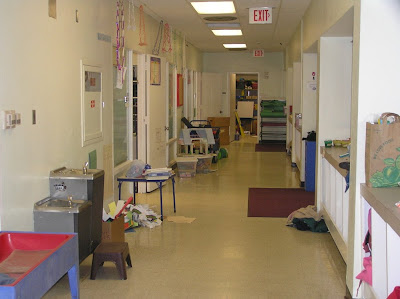 Thirty years ago, the front hallway was carpeted, and in the afternoons you would have found me drawing on the carpet with chalk as I waited for my mom to come pick me up. The cleaning crew probably didn't enjoy having to vacuum my artwork, but I sure had a great time creating it. Friday afternoon, the no-longer-carpeted hallway was just as desolate as every place else in the school:
Thirty years ago, the front hallway was carpeted, and in the afternoons you would have found me drawing on the carpet with chalk as I waited for my mom to come pick me up. The cleaning crew probably didn't enjoy having to vacuum my artwork, but I sure had a great time creating it. Friday afternoon, the no-longer-carpeted hallway was just as desolate as every place else in the school: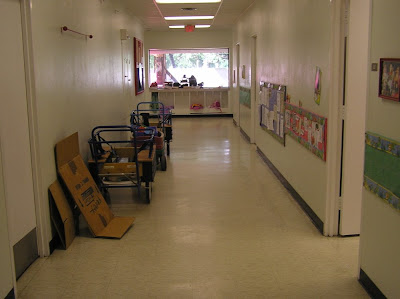 Kirby's cubbyhole was where he kept his lunchbox, his naptime blankets, some toys, changes of clothes, artwork he had made, and other items. We took everything home with us that afternoon, leaving it depressingly vacant:
Kirby's cubbyhole was where he kept his lunchbox, his naptime blankets, some toys, changes of clothes, artwork he had made, and other items. We took everything home with us that afternoon, leaving it depressingly vacant: The reason the HDL was such a great place for so many children over its forty-plus years of existence, myself and Kirby included, was due to its talented and dedicated staff. Among them were Carol, Jeanette and Kari, who povided such wonderful care for Kirby and his classmates:
The reason the HDL was such a great place for so many children over its forty-plus years of existence, myself and Kirby included, was due to its talented and dedicated staff. Among them were Carol, Jeanette and Kari, who povided such wonderful care for Kirby and his classmates: Chris Holzer was Kirby's teacher this past spring. Lori and I are appreciative of the all the work the HDL staff has done for Kirby - he truly loved that school and the developmental progress he made while he was there was enormous - and we hope that they find new employment soon, as they will be an asset to any school that hires them:
Chris Holzer was Kirby's teacher this past spring. Lori and I are appreciative of the all the work the HDL staff has done for Kirby - he truly loved that school and the developmental progress he made while he was there was enormous - and we hope that they find new employment soon, as they will be an asset to any school that hires them: It is indeed unfortunate that such a well-regarded and long-lived institution can be closed at the self-serving and short-sighted whim of a handful of university administrators, but such is life in the academic world. The HDL may be no more, but its service to the children of Houston and the memories it left its students, families and staff alike will last forever.
It is indeed unfortunate that such a well-regarded and long-lived institution can be closed at the self-serving and short-sighted whim of a handful of university administrators, but such is life in the academic world. The HDL may be no more, but its service to the children of Houston and the memories it left its students, families and staff alike will last forever.